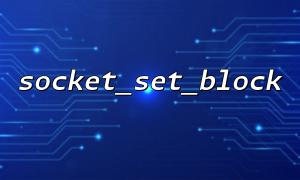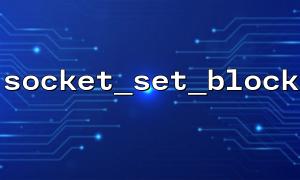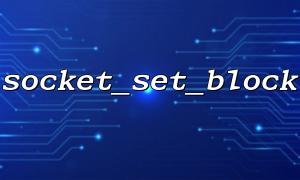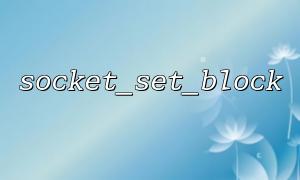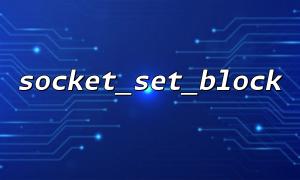In PHP network programming, socket_set_block() is a commonly used function to set sockets to blocking mode. However, many developers encounter a common error when using this function: when the incoming parameter is not a valid socket resource, the function will throw an error or a warning. This brings up a question worth exploring in depth - why must the argument of socket_set_block() be a valid socket resource?
In PHP, the syntax of socket_set_block() is as follows:
bool socket_set_block(resource $socket)
This function receives a socket resource returned by functions such as socket_create() or socket_accept() , and then sets the socket to blocking mode. The so-called "blocking mode" means that when you perform operations such as socket_read() , socket_accept(), etc., the program will wait until data arrives or the connection is established.
A typical usage is as follows:
$socket = socket_create(AF_INET, SOCK_STREAM, SOL_TCP);
socket_bind($socket, '0.0.0.0', 8080);
socket_listen($socket);
socket_set_block($socket);
In this example, socket_set_block() will be executed successfully only when $socket is a legitimate socket resource.
This is determined by the function implementation mechanism inside PHP. In the underlying C language implementation of PHP, socket_set_block() calls the socket operation interface provided by the system. These interfaces need to receive a valid file descriptor (the underlying representation of the socket resource). If the passed in is not a legal resource, PHP cannot perform correct type checks and cannot obtain the underlying file descriptor, so the underlying system functions cannot be called.
When you try to pass in an invalid resource, such as a string, boolean, or null , PHP will throw an error when executing an internal socket operation:
$invalid = null;
socket_set_block($invalid); // Warning: socket_set_block() expects parameter 1 to be resource, null given
This is not only a syntax requirement, but also a security consideration in runtime. Resource usage in network programming is very sensitive, and once an invalid socket is operated, it is likely to cause memory leaks, crashes or unpredictable behavior.
To avoid this error, developers should always check whether the socket was created successfully. For example:
$socket = socket_create(AF_INET, SOCK_STREAM, SOL_TCP);
if ($socket === false) {
die("socket_create() failed: " . socket_strerror(socket_last_error()));
}
if (!socket_set_block($socket)) {
die("socket_set_block() failed: " . socket_strerror(socket_last_error($socket)));
}
Additionally, if you dynamically pass socket resource references in development using external data sources (for example in asynchronous tasks or callback functions), be sure to verify the validity of the variable:
if (is_resource($socket) && get_resource_type($socket) === 'Socket') {
socket_set_block($socket);
} else {
error_log("Invalid socket resource");
}
Many novice developers confuse socket communication with HTTP requests, thinking that socket functions can be used like manipulating URLs. However, it should be noted that socket programming is an underlying network operation and does not support direct URL transmission. For example, the following approach is wrong:
$url = 'http://gitbox.net';
socket_set_block($url); // mistake!$url no socket resource
If you want to establish a socket connection with gitbox.net , you should first parse the hostname and port, and then manually create the connection using the socket series functions:
$socket = socket_create(AF_INET, SOCK_STREAM, SOL_TCP);
socket_connect($socket, 'gitbox.net', 80);
socket_set_block($socket);
The reason why the socket_set_block() function requires that the incoming parameter is a valid socket resource is that it needs to rely on the underlying network interface of the operating system to set the blocking mode. Passing in non-resource types incorrectly will cause the function call to fail and even throw a fatal error. Understanding this helps developers write more robust and maintainable web applications. Whether it is underlying programming or advanced packaging, clarifying the life cycle and type of resource is always the basis for secure development.
